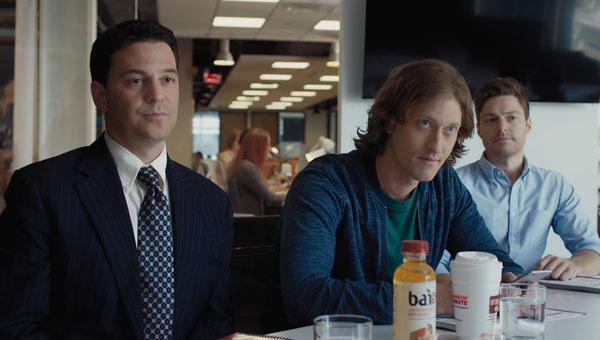Equity Review

Meera Menon follows up her award-nominated feature length debut, Farah Goes Bang, with Equity, a thriller set in the world of investment banking.
The main characters in the film are all female, the director, producers and writers are all female and the theme of female empowerment in the workplace runs throughout.
But surely it’s actually misogynistic to make a big deal out of those facts?
At the risk of getting too political, I’ll just stick to reviewing the film itself.
Equity tells the story of a financial scandal embroiling several characters, notably Naomi, played by Anna Gunn of Breaking Bad fame.
Naomi is an experienced investment banker who we first see licking her wounds after an IPO goes bad.
She pesters her boss, jenga-fan Randall (Lee Tergesen), for a promotion and is in turn pestered for a promotion by her VP, Erin (Sarah Megan Thomas).
In case you haven’t guessed yet, there are a lot of acronyms thrown about with abandon here. Just go with it.
Naomi is told she needs to pull off a big deal and wins a pitch to run the IPO of an entity called Cachet. Cachet is kind of like Facebook for the incredibly paranoid.
Complicating matters are Naomi’s bit-on-the-side / colleague, Michael (James Purefoy), and her old friend Samantha (Alysia Reiner), who now investigates white collar crime.
The fact that Samantha has moved on from prosecuting drug dealers to prosecuting pen pushers naturally makes all the bankers in the film go suspiciously wide-eyed and tight-lipped.
As ostensibly the lead character in a film verging on an ensemble piece, Anna Gunn does well to simultaneously be authoritative and somehow evoke our sympathy in a role where she shouldn’t. James Purefoy is great too, hinting at the malice lurking not far beneath his calm exterior.
The film looks good too, giving a strong sense of the spacious bars and frantic offices where the Wall Street set play and work.

All that said, there is a lot of shouting and banging on tables, with nothing really being said. Which is the main problem with the film itself.
What is the message of the film? That women in work need to stick together? That too much ambition is ok? That screwing over friends and colleagues is the way forward?
Who knows.
The supporting characters too, aside from acting irrationally at times to presumably just move the plot along, are a little thinly drawn, with none of them seeming to have gone on much of a journey by the end of the story. The ambitious remain ambitious, the devious remain devious and the crestfallen remain crestfallen.
By way of the film’s closing lines, there is a callback to an earlier monologue about money, which would make infinitely more sense if voiced by one of the other characters. But enough said.
For a stylish finance-thriller, this isn’t bad, but you will find yourself wondering the point of it all when the credits roll.
And not in the subversive, greed-is-good, anti-message way of the likes of Wall Street or Margin Call.
Conor Brennan